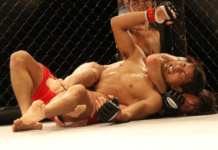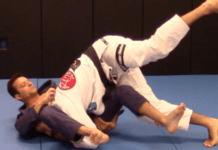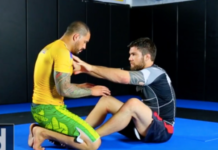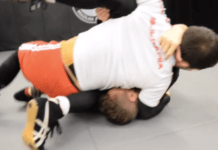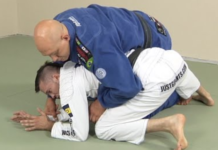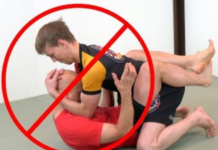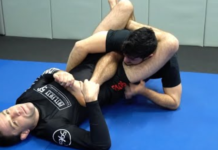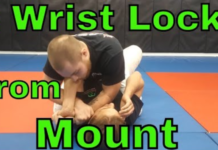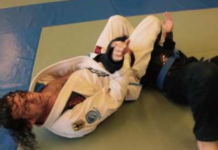Passing the opponent’s guard is one of the most important BJJ skills that you need to build in your arsenal if you are to be successful in the game of BJJ. The fact of the matter is that you will find yourself countless times in the position of needing to pass your opponent’s guard – this is in the nature of the BJJ game. That being said, it’s useful if you have a few methods for passing in your skillset if they are required. It would be good if these moves are high-percentage moves that work very often on your opponents. And one of these high-percentage guard passes that we’re talking about is the leg drag pass.
Leg Drag Guard pass – the gi variant
If your opponent wears a gi, then this move will a lot easier for you to perform. The reason for this is that you will be able to use grips in order to grab your opponent’s gi at the calf. This is not to say that the no-gi variant is ineffective by comparison. However, the good thing about doing this move with the gi is that you have the choice whether to use gi grips or not.
That being said, if you want to get to the position of execution for this move, then you need to open your opponent’s guard first. Your opponent needs to be lying in the open guard position and you need to be standing in front of him. Moreover, he needs to place his feet at your feet – this is the usual mode of defense for this position.
However, you can easily turn the tables on your opponent from here. You need to place your grip and hold your opponent’s leg in place while extending your hip. Then you need to quickly retract your hip while still holding your opponent’s leg in the same position with your arm. Finally, you need to transfer your opponent’s leg to your other side while you’re passing his guard. And then you will be able to fall into side-control. This is the leg drag pass – chances are that you have already seen this move being executed by people practicing BJJ – it’s widely used in the game.
Leg drag pass no gi
Again, you can just as easily do this move if your opponent isn’t wearing a gi as well. So, you need to perform the exact same sequence without having the luxury to place your secure grips on your opponent’s bottom half of the gi. But you can place your grip around your opponent’s lower leg. Sure, it’s a lot safer and secure to place your grips on the gi, but for the purpose of doing this move, grabbing his leg at the ankle will work out just fine.
So, while your opponent is having his feet on your hips, you need to grab one of his legs at the ankle, extend your hips while keeping his leg in place, retract your hips while transferring his leg to your other side and passing the guard. And there you have the no-gi variant.
Blocking the leg drag pass
Once in a while, you will be battling an opponent that will know what to do when you’re using the leg drag pass. You will see that the most widely used way to block this move is done once you shove his leg to the side and you try and circle around to side-control. Your opponent will then use his free leg in order to shove it between your two legs and reset the position. This move doesn’t take a lot of flexibility – almost anyone could do it.
But what your opponent (hopefully) doesn’t know is that you can use this to pass all the way to mount. All you need to do now is drop down so that your opponent will be in a weird scissor-like position with his legs. It will be highly uncomfortable for him to do anything here and all he can do is extend his leg and try to push you off in this way. However, all he’ll do with this move is help you climb to mount.
Leg drag guard pass Drills
The leg drag pass can be used very effectively in anyone’s BJJ game. It’s such a move that’s very easy to implement once you get the basic technique down. Also, you have a backup plan for what to do if your opponent tries to block this move. All you need to do now is practice this move in BJJ and try and implement it while you spar and while you compete. We hope that you’ll have success with it.

